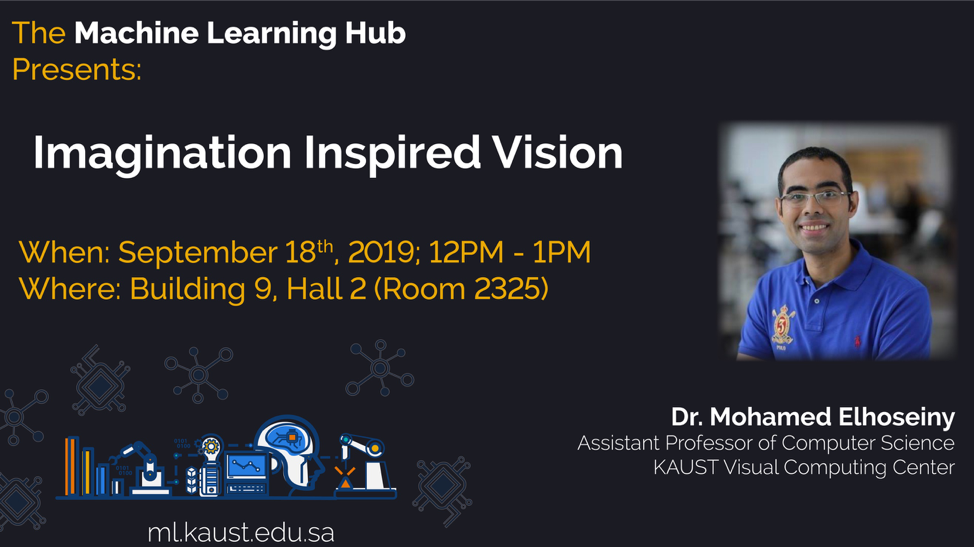
Wednesday, September 18, 2019
12:00 p.m. – 1:00 p.m.
Building 9, hall 2, room 2325
The Machine Learning Hub presents Dr. Mohamed Elhoseiny, an Assistant Professor of Computer Science at the KAUST Visual Computing Ccenter (VCC). He will be presenting his paper: Imagination Inspired Vision on Wednesday, September 18 in Building 9, hall 2 from 12:00 p.m. to 1:00 p.m.
Abstract
Imagination is one of the key properties of human intelligence that enables us not only to learn new concepts quickly and efficiently, but also to generate creative products like art and music. Dr. Mohamed Elhoseiny’s research focuses on developing imagination-inspired techniques that empower AI machines to see the world (computer vision) or to create novel products (e.g., fashion and art); “Imagine to See” and “Imagine to Create”. In this talk, he will cover some of his works on these two directions and will show how they are connected by the developed techniques and how they circle back to benefit each other.
Imagine to See: There are over 10,000 living bird species, yet most computer vision datasets of birds have only 200-500 categories. Typically, there are few images available for training classifiers for most of these categories (long-tail classes). How could imagination help understand visual classes with zero/few examples? Many people might not know what “Parakeet Auklet” is but can imagine it when described in language by saying that “Parakeet Auklet is a bird that has an orange bill, dark above and white below.” If we give this description to an average person, they will be able to select the relevant bird among other different birds, due to our capability to imagine the “Parakeet Auklet” class from the language description. In this lecture, Dr. Elhoseiny will present his most recent work on zero-shot learning by generating imaginary data from text descriptions, presented at the International Conference on Computer Vision and Pattern Recognition (CVPR18).
Imagine to Create: In the short term, Creative AI has a high potential to speed up our rate of generating creative products like paintings, music, animations, etc. as a source of inspiration. The work pursued on modeling Creative AI to produce art (ICCC17) and fashion, has grabbed attention from the scientific community, media, and industry. One of the exciting results he and his team achieved recently is that their AI fashion model was able to create new pants with additional arm sleeves (non-existing in the dataset). The surprising aspect of this design is that professional fashion designers found it inspirational for designing new pants, showing how creativity may impact the fashion industry. His work in that field has been featured by the new scientist magazine and the Facebook F8 conference. Moreover, it has also received the best paper award at the European Conference on Computer Vision (ECCV18) workshop on fashion and art.
In this lecture, it will be demonstrated that these Creative AI techniques for creating a likable unseen circle back to benefit understanding an unseen (zero-shot learning) in Elhoseiny’s very recent work to appear at the International Conference on Computer Vision (ICCV) 2019. With the success of generative models in both tasks, he and his team proposed a data efficient generative model, dubbed as Generative Determinative Point Processes (GDPP) at the International Conference on Machine Learning (ICML) in 2019.
About the speaker
Working at the KAUST VCC and an AI Research consultant at Baidu Research at Silicon Valley AI Lab (SVAIL). He received his Ph.D. from Rutgers university under Prof. Ahmed Elgammal in October 2016 then spent more than two years at Facebook AI Research (FAIR) until January 2019 as a postdoc researcher. His primary research interests are in computer vision and especially about learning about the unseen or the least unseen by recognition (e.g., zero-shot learning) or by generation (creative art and fashion generation). Under the umbrella of how AImay benefit biodiversity, Dr. Elhoseiny’s 6-years long development of the zero-shot learning problem was featured in the United Nations biodiversity conference in November 2018 (~10,000 audience from >192 countries). His creative AI research projects were recognized at the ECCV18 workshop on Fashion and Art with the best paper award, media coverage at the New Scientist Magazine and MIT Tech review (2017, 2018), 20 min speech at the Facebook F8 conference (2018), the official FAIR video (2018), and coverage at HBO Silicon Valley TV Series (2018).
KAUST Machine Learning Hub
ml.kaust.edu.sa

